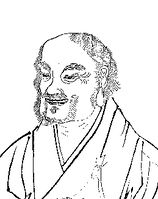Jingxi Zhanran
| PersonType | Category:Classical Chinese Authors Category:Ordained (Monks and Nuns) |
|---|---|
| MainNamePhon | Jingxi Zhanran |
| MainNameTib | 湛然 |
| MainNameChi | 荊溪湛然 |
| SortName | Jingxi Zhanran |
| AltNamesOther | Qi (戚) · Jingqi 荊溪 · Great Master Miaole (Sublime Bliss) · Dharma Master Jizhu (Lord of Exegesis) |
| bio | Jingxi Zhanran. (J. Keikei Tannen; K. Hyŏnggye Tamyŏn 荊溪湛然 (711–782). Chinese monk who is the putative ninth patriarch of the Tiantai zong; also known as Great Master Miaole (Sublime Bliss) and Dharma Master Jizhu (Lord of Exegesis). Zhanran was a native of Jingqi in present-day Jiangsu province. At age nineteen, Zhanran became a student of the monk Xuanlang (673–754), who had revitalized the community on Mt. Tiantai. After Xuanlang's death, Zhanran continued his efforts to unify the disparate regional centers of Tiantai learning under the school's banner; for his efforts, Zhanran is remembered as one of the great revitalizers of the Tiantai tradition. A gifted exegete who composed numerous commentaries on the treatises of Tiantai Zhiyi, Zhanran established Zhiyi's Mohe zhiguan, Fahua xuanyi, and Fahua wenju as the three central texts of the Tiantai exegetical tradition. His commentary on the Mohe zhiguan, the Mohe zhiguan fuxing zhuanhong jue, is the first work to correlate zhiguan (calmness and insight) practice as outlined by Zhiyi with the teachings of the Saddharmapuṇḍarīkasūtra ("Lotus Sūtra"), the central scripture of the Tiantai tradition. In his Jingang Pi ("Adamantine Scalpel"), Zhanran argued in favor of the controversial proposition that insentient beings also possess the buddha-nature (foxing). Zhanran's interpretation of Tiantai doctrine and the distinction he drew between his own tradition and the rival schools of the Huayan zong and Chan zong set the stage for the internal Tiantai debates during the Song dynasty between its on-mountain (shanjia) and off-mountain (shanwai) branches. Zhanran lectured at various monasteries throughout the country and was later invited by emperors Xuanzong (r. 712–756), Suzong (r. 756–762), and Daizong (r. 762–779) to lecture at court, before retiring to the monastery Guoqingsi on Mt. Tiantai. (Source: "Jingxi Zhanran." In The Princeton Dictionary of Buddhism, 391–92. Princeton University Press, 2014. http://www.jstor.org/stable/j.ctt46n41q.27.) |
| YearBirth | 711 |
| YearDeath | 782 |
| BornIn | Jingqi, (present-day Jiangsu province) |
| ReligiousAffiliation | Tiantai |
| StudentOf | Xuanlang (673–754) |
| IsInGyatsa | No |
| Other wikis |
If the page does not yet exist on the remote wiki, you can paste the tag |

